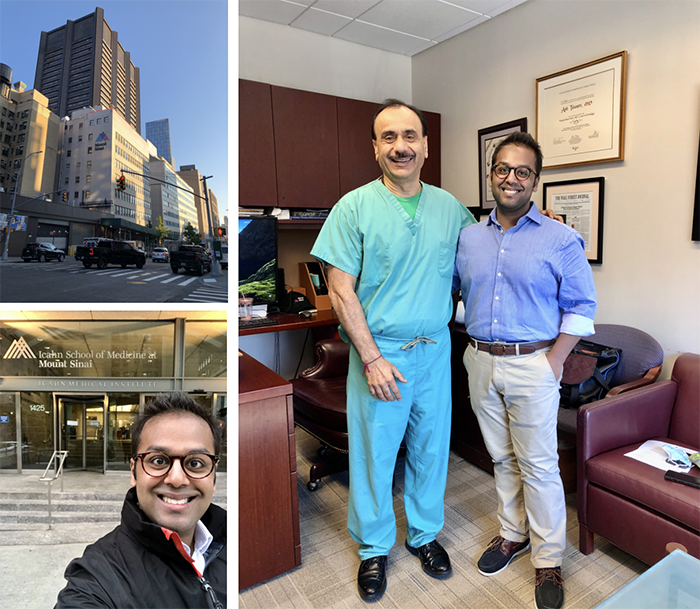
Pic. 1-3: Mount Sinai Hospital and Icahn School of Medicine at Mount Sinai; Me with Professor Asutosh Tewari, Systems Chairman of Urology
Professor Tewari is a world leader in robotic prostate surgery and has pioneered specific nerve sparing techniques and leads a multidisciplinary team committed to improving prostate cancer treatment, research, and education. He has performed over 10,000 robotic radical prostatectomy surgeries and the Tewari Lab is working on unlocking the genomic causes of prostate cancer and translating genomic information to practical physician application through imaging.
This observership was a self-directed venture and Professor Tewari agreed to host me during a period of time when two other eminent Professors (Professor Thomas Bessede and Associate Professor Nyangoh Timoh) from France were also visiting his unit. I gained a unique opportunity to be amongst the presence of company and conversations that involved understanding the neuroanatomy of the prostate in a unique manner.
I also observed several robotic nerve sparing prostatectomies. Professor Tewari’s clinical schedule involved operating on average 3 RALP (Robot-Assisted Laparoscopic Prostatectomy) cases each day Mon-Thursday. The surgeries took place from 7:30 am - 12 pm. The afternoon schedules involved primarily office-based prostate biopsy procedures and clinic consultations at his other practice down-town in East 98th Street (Faculty Practice) (Pic 4-7).
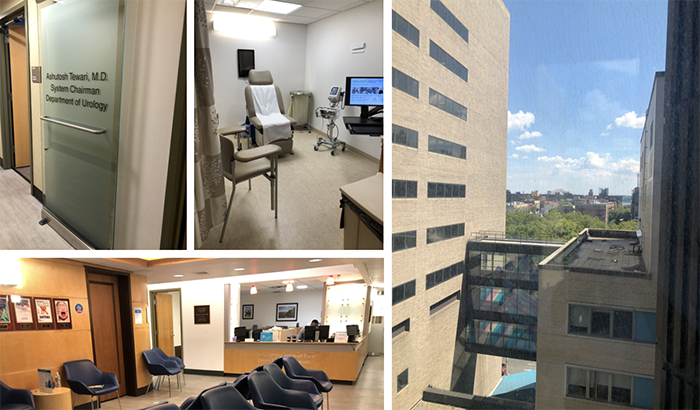
Pic. 4-7: Office-based Urology Outpatient Practice in Downtown NYC, East 98Th street (Faculty practice)
This provided me with in-depth knowledge and detailed understanding of the management of prostate cancer across its spectrum from tailored treatment strategies to the management of the long-term functional sequalae, whilst providing a patient-centred, datadriven, evidence-based, state of the art clinical service.
I was extremely fortunate to be invited to the 1st North American Chapter meeting of the Royal College of Physicians and Surgeons of Glasgow (Pic.8). I witnessed the conferring of the honorary FRCS recognition to Professor Tewari and interacted with some of the world leaders in Urological Surgery and Technology (Pic. 9). To be able to listen to their talks was both fascinating and awe-inspiring. One of my highlights was a discussion with Dr Deepak Chopra, author, alternative medicine advocate and a prominent figure in the New Age movement (Pic 10).
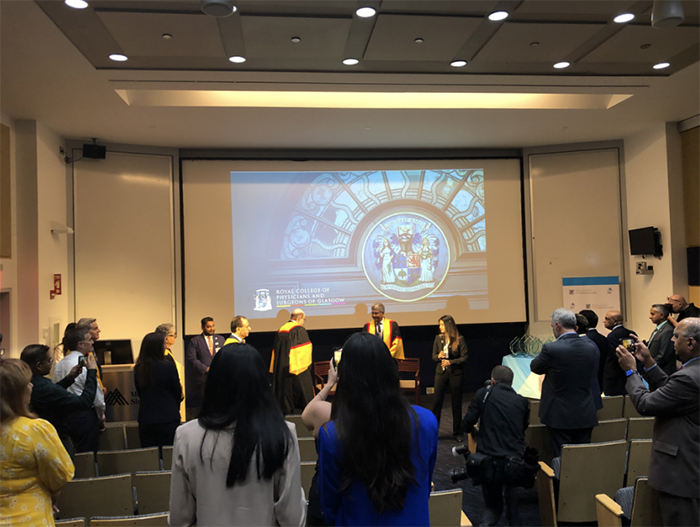
Pic. 8: 1st North American Chapter meeting of the Royal College of Physicians and Surgeons of Glasgow
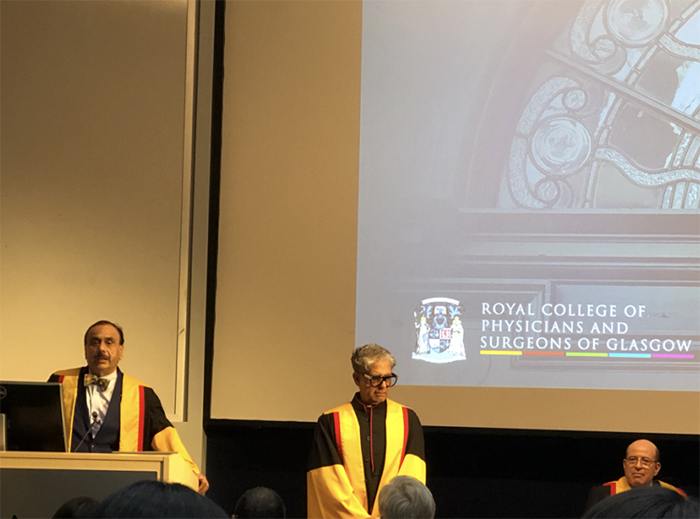
Pic. 9: Honorary FRCS recognition to Professor Tewari from The Royal College of Physicians and Surgeons of Glasgow
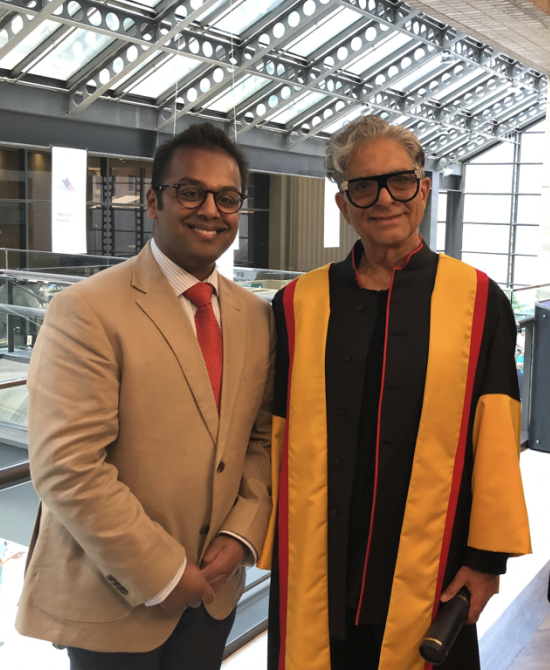
Pic. 10: The Legendary Professor Deepak Chopra also conferred as an Honorary FRCP from The Royal College of Physicians and Surgeons of Glasgow
The pertinent theme of the meeting was “Heal the Healers” and due focus was given to the immense role and contribution healthcare staff have played during the course of the pandemic and what we can do collectively to aid our recovery through what has been a very difficult time, physically and mentally. It was so enlightening to hear the messages of hope, recovery and continuing self-development. Although juxtaposed with my earlier observations that week, involving very objective clinical marker-driven surgical interactions and measures, this holistic and balanced view on life was refreshing and well-adjusted. A sample outline of my weekly timetable during the course of my observership is outlined below. Along with great discussions and seminars from eminent Urological leaders, I had a fantastic opportunity to interact with the fellows and residents at Mount Sinai Dept. of Urology. The present fellow (Dr Adriana Pedroza) gave me an overview of the work that is involved on a day-to-day basis and her astute and efficient overview of the department settled me into the team.
I was also witness to the research meeting discussions that took place on a Wednesday afternoon. Novel and innovative technology-driven research is carried out at Tewari Lab and it was thoroughly enlightening to gain a perspective on the cutting-edge work that his lab is carrying out. From developing cancer vaccines, investigating the epidemiological effects of prostate cancer to novel imaging techniques as biomarkers and working to unlock the genomic causes of prostate cancer are just some of the areas his team are looking at. I am grateful to Dr Sujit Nair, Assistant Professor and Director of GU Immunotherapy Research at the Department of Urology, Icahn School of Medicine at Mount Sinai who also provided me with a great insight into the work the Tewari Lab is doing and is an active presence in the “Coffee with the Chair” meetings every Saturday morning that I have been attending regularly.
This observership, albeit for a short period allowed me to accelerate and advance my knowledge in urology, particularly prostate cancer developments with focus on robotic surgery. This has been one of highlights of my career and the enthusiasm, dynamism and can-do attitudes that I saw amongst this team has allowed me to resume with my own Pic. 10: The Legendary Professor Deepak Chopra also conferred as an Honorary FRCP from The Royal College of Physicians and Surgeons of Glasgow training with similar thoughts. Professor Tewari’s warm, welcoming, and generous leadership qualities are what the international urology community needs. Particularly, the way in which he supports and nurtures his team from non-clinical staff to senior urology peers within his unit. He is a beacon of hard work, technical perfection and convivial attitude, continuing to push the boundaries to achieve the best patient outcomes in his field.
I feel honoured and privileged in having the opportunity to be integrated into this innovative research group and better understand how to maintain the longevity, enthusiasm and dynamism of a longstanding International Research Collaborative. I will endeavour to take the lessons learnt from Mount Sinai and adopt them in my practice upon completion of training in the UK. Professor Tewari’s unit at Mount Sinai has provided me with invaluable clinical lessons, lifelong friendships and a fresh perspective (Pic. 11).
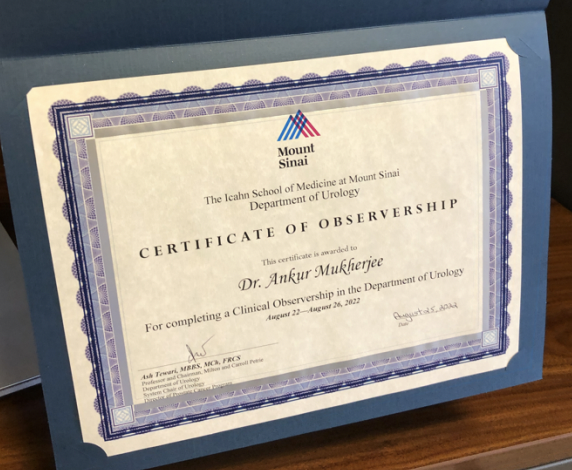
Pic. 11: Certificate of Observership Completion at Mount Sinai under the supervision of Professor Tewari, Systems Chair of Urology
I had some downtime at the end of the busy week for seeing some of the great sights of New York City. I was fortunate to be able to stay right in the heart of Manhattan in Time Square so I frequented the usual tourist attractions and also had some time to indulge in retail therapy that was duly needed (Pic. 12-14)!
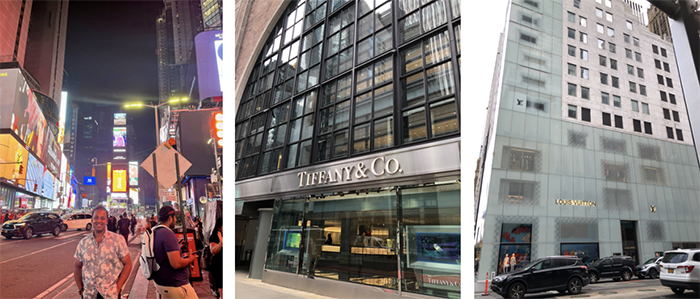
Pic. 12-14: Downtime in NYC – At Times Square and frequenting some iconic stores in 5th Avenue!
I would recommend anyone wishing to undertake a visiting observership to actively communicate with a host organisation and keep an open mind and keen attitude in visiting that unit. It is a truly an enriching and rewarding experience!
Written by: Ankur Mukherjee, Urology Trainee, ST5 Urology, North East England, England
Senior Author: Brian Chaplin, Consultant Urologist, South Tees Hospital, England


